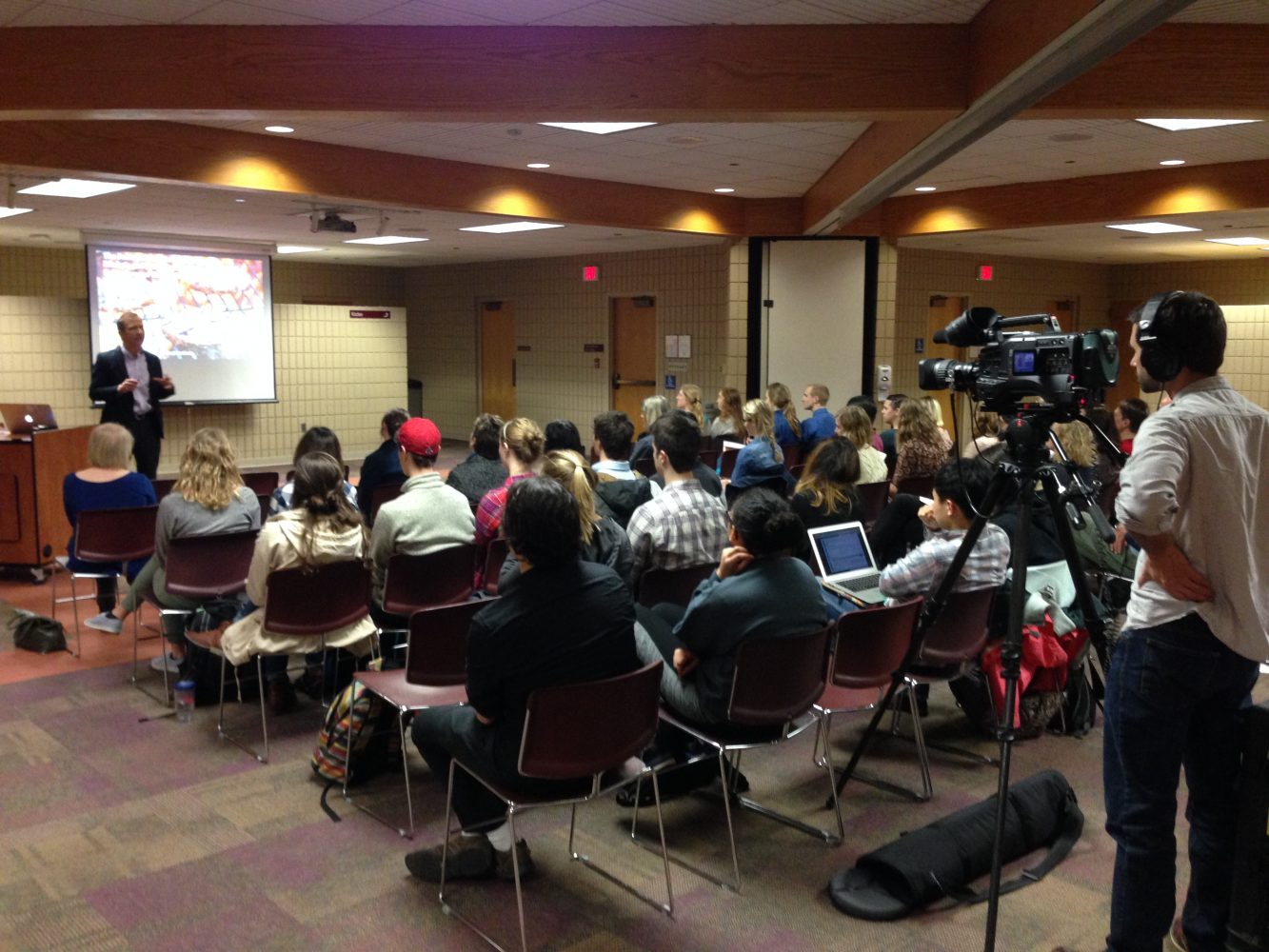Last week, Calvin welcomed venture capitalist and thought leader Bruce Friedrich to give lectures on Wednesday and Thursday afternoon as part of the ninth annual “Animals and the Kingdom of God” lecture series.
The talks were aimed at appealing to a wide breadth of individuals as they were sponsored by Calvin’s biology, business, philosophy and economics departments, as well as the Calvin Center for Innovation in Business.
The Wednesday talk, titled “The Future of Protein: Blending Markets and Food Technology to Solve Some of the World’s Biggest Problems,” focused on emerging food technology systems working to create more sustainable nutrition. Friedrich, a graduate of Georgetown University Law Center, opened the lecture by asking the audience to consider the amount of food that they waste every day.
He posed the question, “Which of you would throw away nine plates of spaghetti just to eat one plate of spaghetti?” This was an analogy meant to introduce the ways in which animal agriculture is an inefficient means of food production and how it will not be able to sustain 2050’s projected population of nine billion people.
Friedrich’s suggested solution to this problem is encompassed in the work of The Good Food Institute (GFI), where he serves as executive director. GFI “works with scientists, inventors and entrepreneurs to make groundbreaking good food a reality,” according to the organization’s website.
In addition, the website says they “focus on cultured and plant-based meat, and eggs—products that are more delicious, safer to eat and better for the planet then their outdated counterparts.” The four main areas Friedrich and his organization focus on addressing are issues of global hunger, environmental consequences, human health consequences and intensification of animal treatment.
Friedrich explained that on average, one hundred million metric tons of wheat and corn are converted into biofuel per year while millions of people go hungry.
“To say it simply, eating less meat helps fight hunger,” quoted Friedrich from Oxfam America. He went onto describe how the process of plant-based products require significantly less stages and resources to be produced compared to typical meat products.
“The food system as it exists is broken and it leads to global hunger because of our desire, in developed countries, to eat animal products,” said Friedrich.
To bring home his ideas on the negative impacts of animal agriculture, Friedrich used “Livestock’s Long Shadow,” a paper published by the United Nations Food and Agriculture Organization, to express the effects of animal agriculture on land degradation, climate change, air pollution and water conservation.
He also spoke about the growing industry of cultivated animal products, or companies that use animals’ cells to grow meat. Companies, such as Clara Foods, Muufri and Memphis Meats, are hoping to bring these products to the shelves of stores in as soon as five years.
“This is absolutely the future of meat,” said CEO of Memphis Meats Uma Valeti according to CBC News. “We plan to do to animal agriculture what the car did to the horse and buggy. Cultured meat will completely replace the status quo and make raising animals to eat them simply unthinkable.”
On Thursday, Friedrich shifted gears in his talk titled, “The Kingdom of God is Within You, Diet as an Invocation of Christ,” as he discussed the merciful treatment of animals from a Christian view, as well as once more emphasizing the inefficiencies of animal agriculture.
Friedrich is a vegan of 28 years who converted after reading “Diet for a Small Planet” by Frances Moore Lappe. He shared some statistics that caused gasping and laughter within the audience, such as one from the Sierra Club that stated if a person cuts meat consumption by 20 percent, it is the equivalent of switching from a Sedan to a Hybrid. He also stated that animal agriculture causes 40 percent more global warming than all modes of transportation combined.
On a smaller scale, Friedrich honed in on the health aspect of consuming less meat, sharing how heart disease is the number one killer in America and how prevention and even treatment can result from changing to a plant-based diet.
At the end of the lecture, Friedrich challenged the audience, Christ-followers and non-followers alike, to consider his points on how faith can be lived out in the diets they choose and how the environment, animals and people in poverty can benefit from a change in diet as well.
“I think Bruce Friedrich made some important connections to the way that our choices in diet can so often be inefficient and unjust, inclusive of both animals and the almost 800 million starving people in our world,” said student and lecture attendee Jonathan Manni. “I think he raised an excellent, thought-provoking question.”








